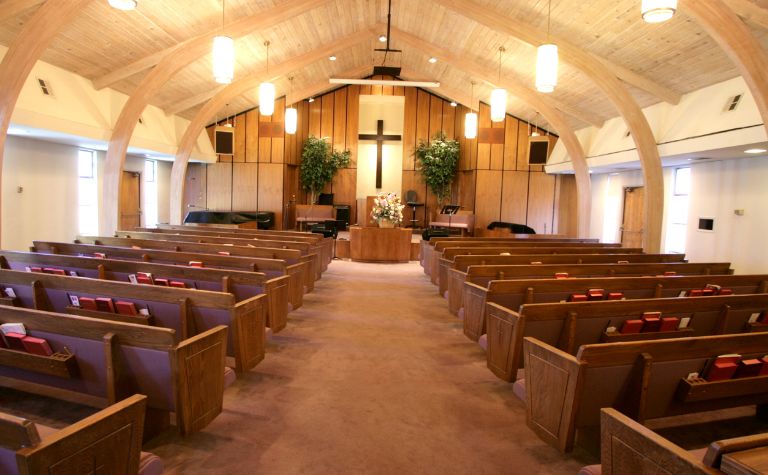Explore the rich diversity of Christian denominations. Learn how varied beliefs, practices, and traditions shape the Christian faith. Understanding these differences can deepen your insight into Christianity’s profound unity and multifaceted expression across cultures and communities.
The charts below compare over 20 Christian branches, denominations, and movements. There are three branches (e.g., Roman Catholicism) and several Protestant denominations (e.g., Baptist). A third category consists of beliefs and practices that cross denominational lines (e.g., Evangelicalism).
Each group is surveyed in five categories: origins, beliefs, practices, size, and divisions. Readers are encouraged to consider these comparison charts as a starting point for further study about each group.
Also, see the World Religions Comparison Chart to learn more.

Origins of Denominations: Dates, Founders, and Locations
| Denomination/Branch | Origin |
|---|---|
| Amish (denomination) | Founded by Menno Simons in the 16th-century Anabaptist movement. |
| Anglicanism (denomination) | Emerged from the English Reformation in the 16th century. |
| Assemblies of God (denomination) | Founded during the Pentecostal revival in 1914. |
| Baptists (denomination) | Originated in the 17th century, promoting believer’s baptism. |
| Brethren (denomination) | Originated in early 18th-century Germany, focusing on Biblical literalism. |
| Church of Christ (denomination) | Developed in the 19th-century American Restoration Movement. |
| Church of God (denomination) | Started in the late 19th-century American Holiness movement. |
| Church of the Nazarene (denomination) | Emerged from the early 20th-century Holiness movement. |
| Eastern Orthodox (branch) | Split from Roman Catholicism during the Great Schism, 1054. |
| Episcopalian (denomination) | Formed in the USA post-Revolution, linked to Anglicanism. |
| Evangelicalism (movement) | Arose during the 18th-century revival movements, emphasizing conversion. |
| Foursquare (denomination) | Started by Aimee Semple McPherson in Los Angeles, 1923. |
| Lutheranism (denomination) | Born from Martin Luther’s Reformation in 16th century Germany. |
| Mennonite (denomination) | Founded by Menno Simons in the 16th-century Anabaptist movement. |
| Methodism (denomination) | Began in 18th-century England under John Wesley’s influence. |
| Pentecostalism (movement) | Emerged in early 20th century American Holiness movement. |
| Presbyterianism (denomination) | Evolved from Calvinist traditions during the Swiss Reformation. |
| Protestantism (branch) | Emerged during the 16th-century Reformation led by Martin Luther. |
| Quakers (denomination) | Began in mid-17th-century England, emphasizing inner “light” and peace. |
| Reformed (theology) | Stemmed from 16th century Protestant Reformation, particularly Calvin. |
| Roman Catholicism (branch) | Traces back to the apostle Peter in 1st-century Rome. |
| Seventh-Day Adventists (denomination) | Founded in the mid-19th century, emphasizing end-times prophecy. |
Also, see the 100 Largest Denominations in America to learn more.

Beliefs of Denominations: Doctrines and Theology
| Denomination/Branch | Beliefs |
|---|---|
| Amish | Emphasize community, simplicity, separation from the world, and pacifism. |
| Anglicanism | Maintains both Catholic and Reformed traditions in balance. |
| Assemblies of God | Advocates Pentecostal doctrines like divine healing and glossolalia. |
| Baptists | Support believer’s baptism, local church autonomy, and congregational governance. |
| Brethren | Value simple worship, non-creedal faith, and biblical literalism. |
| Church of Christ | Stresses restoration, local autonomy, believer’s baptism, and communion. |
| Church of God | Promotes holiness, divine healing, and Pentecostal experiences. |
| Church of the Nazarene | Advocates entire sanctification within the Holiness tradition. |
| Eastern Orthodox | Upholds apostolic succession, seven sacraments, and mystical theology. |
| Episcopalian | Retains liturgical worship and the Anglican via media approach. |
| Evangelicalism | Focuses on being born again, having an active faith, the Bible’s authority, and Jesus’s sacrifice. |
| Foursquare | Preaches the ‘foursquare’ Gospel: Jesus as Savior, Healer, Baptizer, King. |
| Lutheranism | Teaches justification by faith, sacramental theology, and liturgical worship. |
| Mennonite | Advocates adult baptism, pacifism, and community-focused simple living. |
| Methodism | Emphasizes practical divinity, sanctification, and social holiness. |
| Pentecostalism | Emphasizes baptism of Holy Spirit and speaking in tongues. |
| Presbyterianism | Stresses predestination, covenant theology, and presbyterian church government. |
| Protestantism | Emphasizes sola scriptura, sola fide, and priesthood of all believers. |
| Quakers | Highlight inner light, simplicity, integrity, and peace. |
| Reformed | Predestination, Covenant theology, and Sola Scriptura emphasized. |
| Roman Catholicism | Upholds Papal authority, seven sacraments, and Marian doctrines. |
| Seventh-Day Adventists | Observes Saturday Sabbath, believes in prophetic guidance and annihilationism. |
Also, see the Roman Catholic vs. Protestant vs. Eastern Orthodox to learn more.

Practices: Communion, Baptist, Prayer, and More
| Denomination/Branch | Practices |
|---|---|
| Amish | Practice community living, use of horses, dress plainly, shun technology. |
| Anglicanism | Follows liturgical worship, performs seven sacraments, uses Book of Common Prayer. |
| Assemblies of God | Encourages lively worship, speaking in tongues, divine healing. |
| Baptists | Conduct believer’s baptism, weekly communion, and congregational governance. |
| Brethren | Assembles for Lord’s Supper, foot-washing, and simple worship. |
| Church of Christ | Prefers a cappella worship, weekly communion, and believer’s baptism. |
| Church of God | Practices Pentecostal worship, divine healing, and prophetic ministry. |
| Church of the Nazarene | Engages in worship, evangelism, and compassionate ministries. |
| Eastern Orthodox | Celebrates Divine Liturgy, icons, fasting, and monastic traditions. |
| Episcopalian | Observes liturgical worship, lectionary readings, and sacramental rites. |
| Evangelicalism | Prioritizes personal conversion, evangelism, Bible study, and discipleship. |
| Foursquare | Practices vibrant worship, charismatic gifts, healing services. |
| Lutheranism | Holds liturgical worship, two sacraments, catechesis, and choral singing. |
| Mennonite | Commits to pacifism, adult baptism, simple living, and community aid. |
| Methodism | Participates in holiness meetings, open communion, hymn-singing, and social action. |
| Pentecostalism | Engages in lively, expressive worship, faith healing. |
| Presbyterianism | Adheres to Reformed worship, presbyterial polity, and catechetical instruction. |
| Protestantism | Focuses on biblical preaching, sacraments, personal devotion, and fellowship. |
| Quakers | Engages in silent worship, testimonies, peace activism, and simplicity. |
| Reformed | Solemn, simple worship; preaching central. |
| Roman Catholicism | Celebrates Mass, sacraments, Marian devotions, and Papal teachings. |
| Seventh-Day Adventists | Observes Saturday Sabbath, prophetic guidance, healthful living, evangelism. |
Also, see the Baptist vs. Southern Baptist to learn more.

Size of Denominations: Memberships
| Denomination/Branch | Sizes |
|---|---|
| Amish | Small but growing, nearly 350,000 in North America. |
| Anglicanism | Anglicanism: Global membership around 85 million, includes Church of England. |
| Assemblies of God | Over 69 million adherents worldwide, largest Pentecostal group. |
| Baptists | Roughly 40 million globally, notably prevalent in USA. |
| Brethren | Over 1 million worldwide, spread across various branches. |
| Church of Christ | Estimates suggest around 2 million members globally. |
| Church of God | Around 7 million members globally, mostly in US. |
| Church of the Nazarene | Over 2 million members across 160 world areas. |
| Eastern Orthodox | Approximately 220 million adherents globally, mainly in Eastern Europe. |
| Episcopalian | Around 1.7 million members in the US. |
| Evangelicalism | Diverse movement, perhaps 300 million globally across denominations. |
| Foursquare | Over 8 million members in 90,000+ churches worldwide. |
| Lutheranism | Over 75 million members globally, largely in Europe/USA. |
| Mennonite | Over 2 million members globally, spread across continents. |
| Methodism | Estimated 80 million Methodists worldwide, including Wesleyan offshoots. |
| Pentecostalism | Worldwide, over 280 million adherents as of 2021. |
| Presbyterianism | Approximately 40 million members worldwide, notably in Korea. |
| Protestantism | Broad category, encompasses hundreds of millions globally. |
| Quakers | Small, around 377,000 globally, centered in the Americas. |
| Reformed | Millions globally, spread across various denominations. |
| Roman Catholicism | Largest Christian body, over 1.3 billion members worldwide. |
| Seventh-Day Adventists | Over 20 million members globally, with global distribution. |
Also, see the Presbyterian vs. Roman Catholic to learn more.
Divisions in Denominations: Offshoots and Splits
| Denomination/Branch | Divisions |
|---|---|
| Amish | Divided into various orders, each with distinct practices. |
| Anglicanism | Includes High Church, Low Church, and Broad Church. |
| Assemblies of God | Slight variations in practice and theology worldwide. |
| Baptists | Numerous offshoots including Southern, Independent, and Free Will Baptists. |
| Brethren | Divided into Exclusive, Open, and Plymouth Brethren. |
| Church of Christ | Multiple branches differing in practices and theology. |
| Church of God | Multiple independent bodies under the same name. |
| Church of the Nazarene | Mostly unified, minor regional differences. |
| Eastern Orthodox | Various autocephalous churches organized by nationality. |
| Episcopalian | Mainly divided between Anglo-Catholic and Evangelical parties. |
| Evangelicalism | Encompasses wide range of denominations and movements. |
| Foursquare | Mostly unified, but global churches reflect local cultures. |
| Lutheranism | Main branches are the ELCA, LCMS, and WELS. |
| Mennonite | Divisions include Old Order, Conservative, and progressive groups. |
| Methodism | Includes Wesleyan, Free Methodist, and African Methodist Episcopal. |
| Pentecostalism | Assemblies of God, Church of God, Pentecostal Holiness Church. |
| Presbyterianism | Mainly divided into PCUSA, PCA, and other offshoots. |
| Protestantism | Encompasses a wide range of denominations and movements. |
| Quakers | Splits into Evangelical, Conservative, and Liberal branches. |
| Reformed | Presbyterianism, Reformed Baptists, Dutch Reformed Church. |
| Roman Catholicism | Mostly unified, with traditionalist and liberal factions. |
| Seventh-Day Adventists | Mainly unified, some offshoots over prophetic interpretation. |
Also, see the Methodist vs. Roman Catholic to learn more.
Sources:
[1] BBC – Christianity
[2] Wikipedia – Christianity
[3] Britannica – Christianity
Related Questions
Baptist or Methodist? Lutheran or Presbyterian? Assemblies of God or Episcopalian? Because there are so many Christian denominations to choose from today — some studies say there are over 300 —...
Christianity is an important part of the American story in its various denominational expressions. Some denominations came to America from Europe, while others started on American soil. The size of a...
